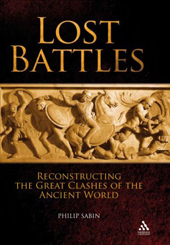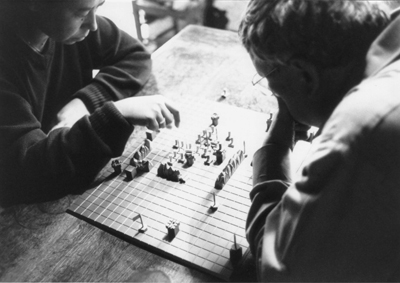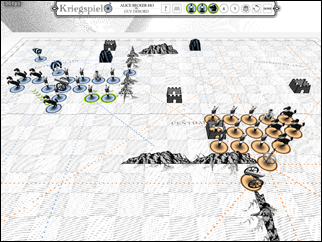Graphs, Maps, Hoplites
Philip Sabin’s new book, Lost Battles: Reconstructing the Great Clashes of the Ancient World, is now available in the US.
Sabin, who teaches courses in conflict simulation in the War Studies department at King’s College, London, seeks to use gaming to resolve discrepancies between the scant and often contradictory sources for ancients battles. Capitalizing on the long-running appeal of this era for both gamers and popular audiences, the book is essentially the presentation of his research model, along with the rules set and data needed to refight several dozen of the actual battles. Here’s a quick taste of the methodology:
What I aim to contribute to this and to similar debates is to set each battle much more clearly within the context of the general run of other similar ancient engagements, and thereby highlight which of the various conflicting interpretations are most in line with what we know from elsewhere. How long a frontage did other armies of similar size occupy, what sort of numerical odds was it feasible for armies like Alexander’s to overcome, how many war elephants did it take to sway a battle and what kind of cavalry manoeuvres were practical as the infantry lines engaged? To give a scientific analogy, one might imagine plotting the different interpretations of the Hydaspes as different x and y coordinates on a piece of graph paper. Without any further information, it is very difficult to tell which of the various plots is more valid, but if other battles are also plotted on the same paper, and if it is possible to evolve scaling principles to take account of differences that exist between similar engagements, then it may be possible to discern a ‘best fit’ line that will link up the majority of points and thereby make outliers stand out as unlikely exceptions to the general rule. (xiii)
This work has obvious and important similarities to the discourse of modeling in digital humanities research (my day job), as articulated by Sabin’s colleague at King’s, Willard McCartry, as well as Franco Moretti in his Graphs, Maps, Trees—so, in order to help cement that connection, I’ve also opted to review Sabin’s book for Digital Humanities Quarterly.



